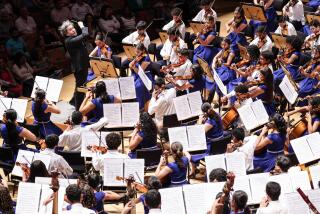Music of tomorrow
The Young Artists International Seventh Annual Laureates Festival culminates Sunday with a performance in the Walt Disney Concert Hall. The brainchild of conductor Eduard Schmieder and his violinist wife, Laura, -- the Russian emigres who founded it in 1991, the Laureates Festival brings together 26 prizewinners, ages 17 to 31, from around the world every summer for a week of performances as the group I Palpiti.
Five of the musicians -- from Germany, Poland, Ukraine, Kazakhstan and the United States -- took a break after a recent rehearsal to share their thoughts about classical music today.
*
“Musical life in Ukraine is dead,” said 20-year-old cellist Georgiy Lomakov, who left Ukraine when he was 12.
Why? Money, is one issue.
“Music in the Soviet Union had been supported as in no other country in the world, and with the breakup [in 1991] -- now almost 15 years after -- maybe only one or two orchestras [in Ukraine] are supported, and the musicians are living very often below the survival minimum. I’m not thinking about going back to be a professional musician. I don’t see a future for me there.”
Cellist Eldar Saparayev, a 20-year-old native of Kazakhstan, another former USSR republic, talked of similar problems in his homeland.
“The people of Kazakhstan really like classical music,” said Saparayev, who now lives in Zurich, Switzerland. “We don’t have so often really big concerts, but when we have them, the hall will be full. People come. They pay really big money. But it’s difficult for a musician to make a career in Kazakhstan. It’s the ninth biggest country in the world, but we don’t have space for musicians.”
Even music-loving Germany has had setbacks since its reunification in 1990.
“I experienced myself the closing down of a big orchestra because of a lack of money, the orchestra of the capital city of Brandenburg,” said Peter Rainer, 31, concertmaster of the Kammerakademie Potsdam. “There’s a cutdown all over the world when it comes to classical music.”
Violinist Karina Canellakis, 23, a Manhattan native, felt conflicted.
“For any American, you come to a fork in the path where you can choose to stay in America or go to Europe,” she said. “Audiences in Europe are more appreciative and more aware of the classical repertoire. But there’s also something to be said for staying and trying to change the situation in the States.”
None of these musicians was ready to throw in the towel, however.
“Classical music is not dying, but it is just less popular than it was,” said Polish pianist Stanislaw Drzewiecki, 17. “It’s very important to educate young people. But I can’t say classical music is good and popular music is bad because there are people who like popular music. It is my choice.”
Talk of contemporary music set off a lively interchange.
“The problem is that the music is very artificial,” said Ukrainian cellist Lomakov. “This means it is not open to understand emotionally, only rationally.”
“Like an intellectual exercise,” said Canellakis.
“Exactly.”
“But normally these composers are not popular,” said Drzewiecki.
“They are, especially among musicians who seek out compositions that challenge them. Composers like Elliott Carter or John Cage,” said Canellakis.
“Why John Cage?” Rainer interjected. “John Cage has a lot of emotion.”
“How about the four minutes and 33 seconds of silence?” Canellakis asked. “Does that have a lot of emotion?”
“Well, it could be very emotional,” Rainer said.
Canellakis said the answer for these musicians might be to perform music they’ve written themselves.
“Maybe that’s why rock bands are successful,” she said, “because there’s an element of sincerity that maybe we can’t get across by performing someone else’s music, especially someone who’s been dead 200, 300 years.”
Sincerity was very much on their minds.
“We, as musicians, very often have lost our artistic honesty,” said Lomakov. “Our knowledge and craftsmanship have grown much better than older musicians’, but the personality and attitude which are able to give something that you could never get but in the concert hall, there we’ve failed.”
Ukrainian cellist Saparayev agreed.
“What I’m afraid of is that music has become some kind of sport. Everything is more quick today. Twenty or 30 years ago, every conductor needed maybe a week or so of rehearsals. Now it’s three rehearsals and it’s OK. You have music, of course, but for me it’s like a quick tour. It’s not life.”
So how to make sure there is life in their music?
“I think the most important thing for us now, for all of us sitting here and every classical musician is that we project a love of what we are doing,” said Canellakis.
“As long as we continue to project that love in every single performance, people will respond to that.”
*
Laureates Festival
Where: Walt Disney Concert Hall, 111 S. Grand Ave., L.A.
When: 8 p.m. Sunday
Price: $20 to $75
Contact: (310) 281-3303
More to Read
The biggest entertainment stories
Get our big stories about Hollywood, film, television, music, arts, culture and more right in your inbox as soon as they publish.
You may occasionally receive promotional content from the Los Angeles Times.










